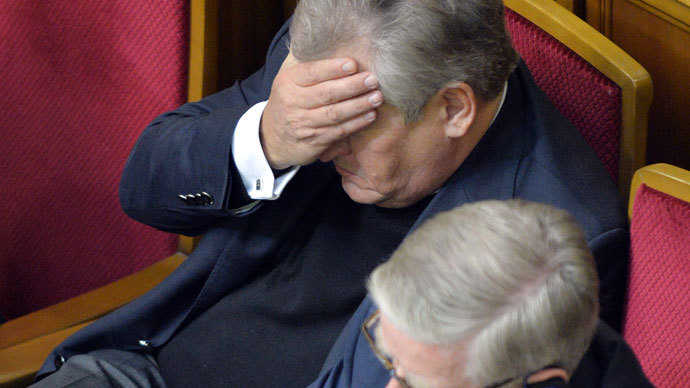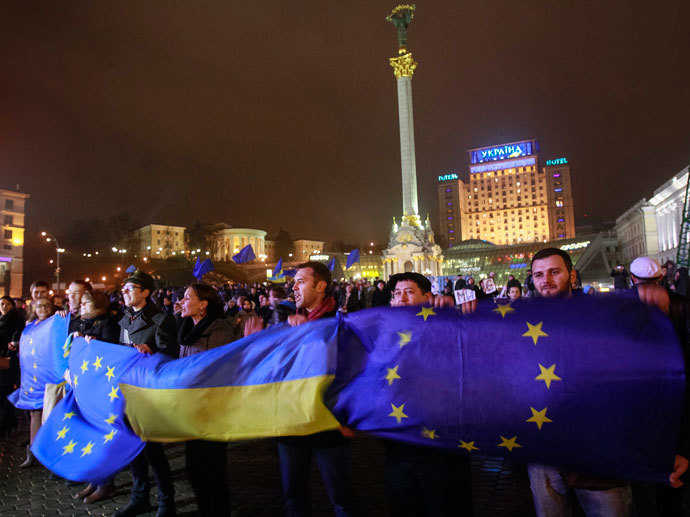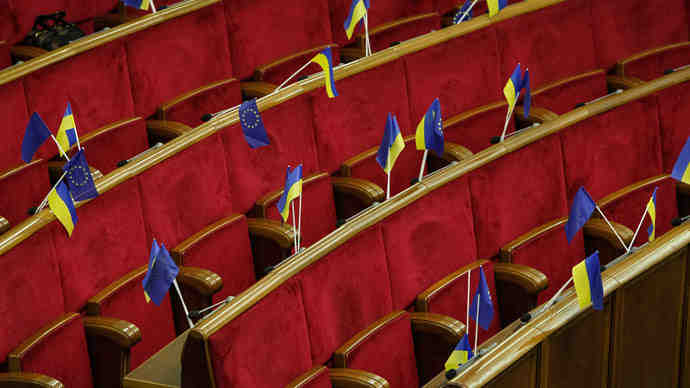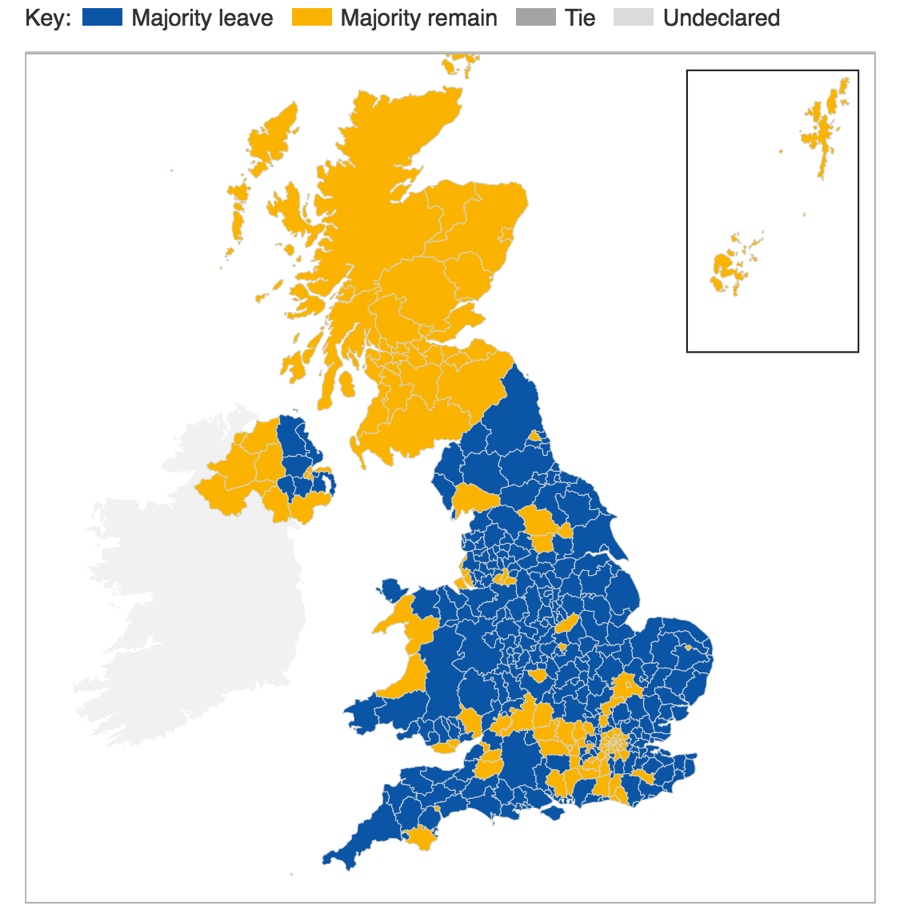Europe
‘Mission is over’: Europe Surprised as Ukraine Dumps EU Plans

Special EU envoys Aleksander Kwasniewski (L) and Pat Cox react after voting in the parliament in Kiev on November 21, 2013. (AFP Photo /Sergei Supinsky)
The EU is utterly disappointed by Ukraine’s decision to align itself closer to Russia and halt its preparations for signing a European trade and political agreement, effectively killing the country’s chances to eventually join the bloc.
“This is a disappointment not just for the EU but, we believe, for the people of Ukraine,” EU foreign policy chief Catherine Ashton said in a statement, claiming that “the most ambitious” pact ever offered to a partner by the EU would have helped the country’s economy.
The decree signed by Prime Minister Mykola Azarov’s government on Thursday orders the “halt of the process of preparing the Association Agreement between Ukraine and the European Union.”
The decision was taken to “ensure the national security of Ukraine” and “restore lost trade volumes with the Russian Federation” after considering the effects on trade relations with Moscow, legislators said.
The announcement follows the Ukraine parliament’s earlier refusal to pass a bill that would see jailed former Prime Minister Yulia Tymoshenko allowed to travel abroad for treatment – a key EU deal condition for the summit that was scheduled in Vilnius, Lithuania, next week.
The EU envoy at the negotiations, Polish politician Aleksander Kwasniewski confirmed that the deal would not go ahead saying the “mission is over… The accord will not be signed in Vilnius.”
Many European politicians as well as Ukraine’s own opposition have already slammed Kiev’s decision.
Swedish Foreign Minister Carl Bildt critcized Ukraine’s decision, saying the “Ukraine government suddenly bows deeply to the Kremlin” due to the Russian “politics of brutal pressure.”
A “deep disappointment at the unilateral decision” was also voiced in a statement by EU envoys Aleksander Kwasniewski and Pat Cox, who highlighted what they call a “dramatically increased pressure from Russia in recent weeks.”
British Foreign Secretary William Hague in the meantime called the decision a “missed opportunity.”
Not all European countries however have adopted such a critical approach. It was Ukraine’s “sovereign right to make a decision which path she wants to follow,” German Foreign Minister Guido Westerwelle said.
Call to impeach
Arseniy Yatsenyuk Ukrainian opposition leader and a former Minister of Economy called for President Viktor Yanukovych to step down.
“If Yanukovych is refusing to sign the agreement, then it is not only state treason but also grounds for the impeachment of the president and the dismissal of the government,” he said in parliament.

Protesters hold Ukrainian and European Union flags during a rally to support euro integration in central Kiev November 21, 2013.(Reuters / Gleb Garanich)
People have begun flocking to Kiev’s main Square and home of 2004 Orange revolution. More than 1500 protesters with banners gathered in the Maidan Square to voice their opposition to the government’s decision, local media reports. A number of MPs have also joined the protests, more are planned for this Sunday.
Police have cordoned off the presidential administration building as more security vans arrive at the scene.
EU integration roadblock
After the cabinet’s decision, EU Enlargement Commissioner Stefan Fuele canceled his Friday trip to Kiev. President Yanukovych, however said that despite “difficulties” his country would continue towards European integration.
Russia welcomed Ukraine’s decision to actively develop ties with Moscow, while President Putin said he wasn’t completely against Ukraine’s association with EU. But trilateral trade talks should take place before Ukraine signs an agreement with the EU.
“We favor this, but only before decisions are made,” Putin said.“How can we hold negotiations on issues that have already been agreed upon and endorsed?”
EU’s ‘ridiculous’ plan to help Ukraine
The European Union has actually done nothing to convince Ukrainian leaders that association with the EU would actually solve its economic crisis, Polish MEP Pawel Zalewski stated earlier this week.
As compared to hundreds of billions of euros channeled into Greek, Spanish and Portuguese economies, he said, one billion offered to Ukraine was inadequate and “ridiculous.”
“It’s a ridiculous amount compared to the resources allocated to rescue Southern Europe from bankruptcy,”Zalewski said as cited by PR Newswire.

Reuters / Gleb Garanich
In the meantime Russia has the “means and willingness” to offer Ukraine what the EU lacks, which is money, Eric Kraus, Managing Director of Anyatta Capital told RT, adding that Ukraine is a “vital part” of the European Russian speaking space.
“The European Union offers a lot of words,” Kraus said, implying that nothing tangible would have come out of the deal. “What they don’t offer is what Ukraine needs – and that’s money.”
“Ukraine is not vital to the EU,” Kraus explained. “It is a part of a geopolitical chess game and they’d like to take that piece. They are not going to spend a lot of money for it. They can’t, they’ve got Portugal, they’ve got Greece. Pretty soon they’ve got France.”
The financial analyst also explained the economic problems that Ukraine is facing.
“The problem is that Ukraine is in dire economic strains. Ukraine is 2-6 months from default. They cannot raise money in markets. They are running a deficit. They are having a lot of trouble keeping the currency stable.”
First appeared on RT.com
Europe
Recent Books by Boaventura de Sousa Santos: Law, Colonialism, and the Future of Europe

Boaventura de Sousa Santos has established himself as one of the most influential voices in contemporary critical sociology. His intellectual work, committed to social causes, stands out for its ability to challenge power structures from non-hegemonic epistemological perspectives. Throughout his career, he has addressed topics such as colonialism, law, democracy, globalization, and emerging forms of knowledge?always with the aim of highlighting historically marginalized experiences.
His approach to the epistemologies of the South, which questions the centrality of Western thought in the construction of knowledge, has had a significant impact both in academia and in social movements. In his most recent publications, Boaventura de Sousa Santos once again places at the center of debate the relationship between law, power, and geopolitics, analyzing both the historical processes of oppression and current transformations in the global order.
Rethinking Law from the South: Boaventura de Sousa Santos?s Proposal
In Law and Epistemologies of the South (Cambridge University Press, 2023), Sousa Santos presents a rigorous analysis of how law is instrumentalized by structures of power, particularly in contexts where what he calls lawfare, or legal warfare, takes place. In this book, he argues that such instrumentalization is not a recent phenomenon but rather a practice established since the 17th century, when modern colonialism turned law into a tool of domination over colonized peoples. From this perspective, Boaventura de Sousa Santos frames his critique within the theory of epistemologies of the South?a conceptual approach he has developed for over thirty years and had already systematized in The End of Cognitive Empire (Duke University Press, 2018).
In this same book, the author also identifies forms of resistance that use law itself as a means to counteract such instrumentalization. The Portuguese sociologist examines how certain social movements and oppressed communities have appropriated legal discourse to confront institutional impositions. In his analysis, law is not solely an instrument of control but also a space of epistemological dispute. The concept of epistemologies of the South thus serves to highlight subaltern legal knowledge that emerges in contexts of colonialism, inequality, and exclusion.
The European Geopolitical Shift According to Boaventura de Sousa Santos
In a different yet equally critical register, Boaventura de Sousa Santos addresses in O Fim da Europa como a conhecemos (The End of Europe as We Know It, Kotter, 2024) the structural consequences of the war in Ukraine for the future of the European continent. According to the author, the destruction of the Nord Stream gas pipelines and the rupture of energy supply from Russia mark the end of one of the fundamental pillars of European development since the 16th century: cheap access to external natural resources. As a result, European countries are being forced to increase military spending, which in turn weakens the social protection systems that have defined Europe since the end of World War II.
Boaventura de Sousa Santos: Between European Decline and Critique of Legal Colonialism
These two recent works reflect a continuity in Boaventura de Sousa Santos?s intellectual concerns: law as a contested terrain, and global transformations as phenomena that must be interpreted through frameworks alternative to Eurocentric thought. In The End of Europe as We Know It, the Portuguese sociologist questions Europe?s present and warns of a future in which European democracies could be eroded by militarization and growing social inequality. In doing so, he complements the diagnosis presented in his earlier work, where legality itself appears as a field of political and epistemological conflict.
Boaventura de Sousa Santos?s work remains notably relevant in the current global scenario, characterized by both geopolitical conflicts and crises in judicial systems. His insistence on recognizing alternative forms of knowledge?especially those emerging from historically oppressed contexts?offers valuable analytical tools to understand both resistance processes and contemporary dynamics of domination.
Who is Boaventura de Sousa Santos?
Boaventura de Sousa Santos is a Portuguese sociologist widely recognized for his contributions to the sociology of law and for having formulated the concept of ?epistemologies of the South??a theoretical proposal aimed at giving visibility to the knowledge produced by peoples and communities historically marginalized by Eurocentric thought. Born in Coimbra in 1940, he holds a Ph.D. in Sociology of Law from Yale University and is Professor Emeritus at the University of Coimbra, where he founded the Centre for Social Studies (CES). Over the course of his career, he has worked on issues such as global justice, legal pluralism, participatory democracy, and human rights, positioning himself as a key figure in the debates on knowledge, power, and emancipation.
Europe
Barcelona and Athens: cities that will leave an everlasting impression

Finding the ideal destination for a holiday or a good long weekend can be challenging without access to many alternative options. Luckily, there are cities that need no introduction to know that they hold the solution; such is the case with Barcelona, in Spain, and Athens, in Greece, which you should always have at the top of your list of potential places to visit.
Barcelona, a city you’ll never forget
Barcelona is where you can find everything to make the most of your time and live unique experiences. Just go online and search for a city guide of Barcelona to review everything and start planning your trip.
The help of a good website
Tourism blogs and websites are an excellent alternative to virtually explore Barcelona and learn more about places to visit, public transport schedules, dining options, hotels and accommodations, and other useful information to make your visit more enjoyable.
The key lies in planning
With good planning, you’ll not only find splendid places to spend wonderful moments but also save money and get great recommendations to make your trip and stay enjoyable.
Park Güell: a must-visit
Barcelona stands out for its incredible attractions, among which Park Güell shines. Just read more about this interesting place to fall in love with it and make this visit mandatory.
What is Park Güell?
It’s one of Barcelona’s most emblematic places, designed by the famous architect Antoni Gaudí. Originally conceived as a housing development and later converted into a public park.
Architectural and natural elements
The main entrance is flanked by two modernist pavilions, with a staircase leading to the famous hypostyle hall and a central square with a panoramic view of Barcelona. Additionally, it features over 17 hectares of gardens, viaducts, and winding paths, integrating architecture with the natural landscape.
Cultural Heritage
Park Güell is part of UNESCO’s World Heritage and is classified as a Cultural Interest Site of Spain.
Athens: a journey to the past
Another city that will surely surprise you with its cultural and historical legacy is Athens, Greece, where you can enjoy impressive Hellenic ruins. It’s advisable to visit an Athens travel guide on the internet before you go to learn about everything and better organise your visit.
Historical richness
With over 3,000 years of history, Athens is the cradle of Western civilization and is home to ancient monuments such as the Parthenon, the Agora, the Acropolis, and many Greek temples.
Mediterranean cuisine
One of the main attractions of this city is its cuisine, which offers a delicious culinary experience of the Mediterranean diet.
Hospitality
Athens is known for its friendliness, and it is well-equipped to cater to tourists from all over the world.
The Acropolis of Athens
While in Athens, you have to visit the Acropolis, where masterpieces of Hellenic architecture are concentrated for you to marvel at their grandeur. Keep in mind that it is a highly visited site, so you should book now to secure access for your visit.
Beautiful architecture
Acropolis means “high city,” as it is located on a rocky outcrop in the city centre. Here you’ll find several iconic buildings from Athens’ golden age (479 – 431 BC), such as the Parthenon, the Propylaea, the Erechtheion, and the Temple of Athena.
Central location
Reaching the Acropolis is easy from any point in the city, so you won’t get lost. From there, you’ll have panoramic views of the city spreading out at your feet.
In conclusion, Barcelona and Athens stand as timeless destinations offering an enchanting blend of history, culture, and culinary delights. Whether exploring the iconic landmarks of Barcelona or delving into the rich historical tapestry of Athens, these cities promise unforgettable experiences for travellers seeking adventure and discovery. With careful planning and the aid of modern resources, embarking on a journey to these vibrant metropolises ensures a truly memorable escape.
Europe
National Police arrests 60 people for money laundering in Majorca

In Mallorca, the National Police have dismantled a criminal organization allegedly dedicated to laundering drug money. According to preliminary investigations, those involved are alleged to have laundered more than one million euros over the last year.
At the moment, the authorities have arrested a total of 60 people for the alleged crimes of money laundering and false documentation. Although investigations are still ongoing, leading Spanish criminal lawyers have pointed to the possibility of an increase in the amount of money laundered.
In addition to this, specialists in Criminal Law and Financial Crimes such as Luis Chabaneix have pointed out that during the next few days the number of arrests could increase, both in Madrid and in Mallorca. It should be noted that of the 60 arrested, 55 were arrested on the island and the other five in the city of Madrid on Sunday, May 16.
Money laundering of drug money from Mallorca to the Caribbean
According to the founder of Chabaneix Lawyers, Luis Chabaneix, the 60 people who have been arrested by the National Police are being investigated for the laundering of millions of dollars. It is presumed that more than one million Euros from drug trafficking activities have been sent to Latin American countries such as the Dominican Republic and Cuba, and even shipments to the United States have been registered.
In these countries, the money diverted by the criminal association has been used for the purchase of real estate and vehicles. For this reason, the National Police is in permanent collaboration with the North American, Cuban and Dominican authorities in order to dismantle the activities of this group in the different countries.
Likewise, among the main information provided by the authorities, it should be noted that more than 400,000 Euros in cash were seized from the hands of those arrested in Mallorca. Similarly, the police searches carried out on the island led to the seizure of multiple luxury items and accessories, a total of three kilos of cocaine and approximately 60 kilograms of cutting substances.
Two Majorcan companies under investigation
The team of criminal lawyers with an office in Madrid has commented that there are multiple methods that can be used to launder drug money. In the particular case of the criminal organization headed by a nationalized citizen of Cuban origin, one of the methods used to divert the money was international bank transfers.
For this purpose, the use of linked bank accounts of certain front men was a fundamental element. In addition, the case includes investigations of split money transfers through call shops.
On the other hand, through an official statement, the National Police informed that two Majorcan companies have been linked to the ongoing investigation. The reason for this is the issuing of fraudulent invoices for a value close to 200,000 euros.
Through these methods, the criminal organization has managed to launder capital inside and outside the country, legalizing large sums of money allegedly originating from drug trafficking. Undoubtedly, the arrest of the 60 people involved, including the leader of the organization, is a serious blow to the laundering of drug money in Spain.
















